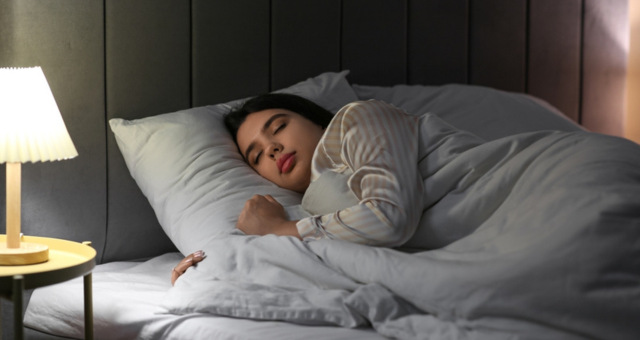Medically Reviewed by Lucas Rosa, PhD in Molecular Biology
Ever feel out of sorts after a poor night’s sleep? Groggy brain, irritated mood, maybe even cravings that don’t make sense? That’s not just fatigue – it’s your hormones sounding the alarm.
Sleep isn’t just a break; it’s a powerful, nightly reset button for your body, especially your hormones. From balancing stress levels to regulating hunger and reproductive function, your hormone health is deeply linked to how well you sleep.
In this blog, we’ll explore the science-backed ways sleep greatly affects hormones, the amazing restorative work your body does while you’re snoozing, and simple steps you can take to build better sleep habits – all to help your body function at its very best.
What Happens to Your Hormones While You Sleep?
When you drift off, your body doesn’t power down – it powers up in a different way. While you sleep, several key hormonal processes take place:
- Melatonin (the “sleep hormone”) rises at night, helping your body wind down and shift into rest mode.
- Growth hormone, which helps with repair and regeneration, is released in deep sleep stages.
- Cortisol, the stress hormone, drops to its lowest at night and rises in the morning to wake you up gently.
- Hormones like insulin, leptin, and ghrelin also regulate appetite and metabolism during sleep.
Think of sleep as your body’s quiet time for hormone recalibration. If sleep is off track, your hormones likely are too.
How Sleep Deprivation Disrupts Hormones
When you consistently get poor sleep – or not enough of it – your body enters a state of stress. That stress sets off a domino effect of hormonal imbalances that can impact your energy, mood, weight, immunity, and even reproductive health. Let’s break it down;
- Cortisol, your main stress hormone, begins to spike earlier and higher than normal. While this hormone is essential in small amounts, chronically high cortisol can lead to anxiety, belly fat accumulation, sugar cravings, and even blood pressure problems. (1)
- Leptin, the hormone that signals fullness, decreases, while ghrelin, the hormone that makes you feel hungry, increases. This imbalance explains why sleep-deprived people often crave carbs, sweets, and salty snacks the next day – your brain is literally being tricked into thinking you’re starving. (2)
- Insulin sensitivity drops, which means your body doesn’t manage blood sugar as well. Over time, this increases the risk for insulin resistance and type 2 diabetes. (3)
- Sex hormones like estrogen, progesterone, and testosterone can also become dysregulated. Those assigned female at birth may notice irregular periods or worsened PMS, while those assigned male at birth may experience reduced libido and low energy. (4)
- Thyroid function may also take a hit. Poor sleep can contribute to symptoms of hypothyroidism – like fatigue, brain fog, and weight gain – even if your lab results are borderline normal. (5)
So while it may seem like missing a few hours of sleep is no big deal, over time it can create a hormonal environment that makes you feel wired, tired, moody, and off balance. And the longer it continues, the harder it becomes to break the cycle – until you start prioritizing rest.

Quality Sleep Over Sleeping Longer
You might be in bed for 8 or even 9 hours, but if you’re constantly waking up, tossing and turning, or never reaching deep sleep, your body isn’t getting the restorative benefits it needs. That’s because not all sleep is created equal.
Your body cycles through different sleep stages – light sleep, deep sleep, and REM (Rapid Eye Movement) sleep – each with its own unique purpose. It’s during deep sleep that your body does its most important healing work, like repairing tissues, boosting your immune system, and releasing growth hormone. Meanwhile, REM sleep is essential for memory processing, mood regulation, and brain detoxification.
If these stages are interrupted or shortened, the hormonal repair process is incomplete. For instance, melatonin production may not peak properly, which disrupts your sleep-wake rhythm. Growth hormone may not be released in adequate amounts, affecting recovery and metabolism. Over time, this can lead to chronic fatigue, weakened immunity, mood disorders, and difficulty maintaining a healthy weight – even if you’re technically “sleeping enough.”
That’s why the depth and continuity of your sleep matter just as much – if not more – than how many hours you log. True rest comes from sleep that’s undisturbed and aligned with your body’s natural circadian rhythm.
Building Sleep Habits That Support Hormones
Sleep hygiene is the set of habits that help you fall asleep faster and stay asleep longer. Here’s what you can do for better sleep:
- Set a consistent bedtime and wake-up time (even on weekends):
Your body thrives on routine. Going to bed and waking up at the same time every day keeps your circadian rhythm in sync, helping hormones like melatonin, cortisol, and insulin follow a predictable pattern. This consistency can improve both how fast you fall asleep and how deeply you sleep.
- Limit screen time at least 1–2 hours before bed:
Blue light from phones, laptops, and TVs suppresses melatonin, the hormone that signals your body it’s time to sleep. Instead of scrolling, try reading, stretching, or listening to calming music to help your body shift into rest mode.
- Keep your bedroom cool, dark, and quiet:
A slightly cooler room (around 65–68°F or 18–20°C) helps lower your core body temperature, which naturally happens before sleep. Blackout curtains and white noise machines can further minimize disruptions, helping your body stay in deep, hormone-balancing sleep stages.
- Avoid heavy meals, caffeine, and alcohol before bed:
Eating late can interfere with digestion and reduce melatonin production. Caffeine, even 6–8 hours before bed, can linger in your system and keep you wired. Alcohol might make you sleepy at first, but it fragments sleep quality and interferes with REM cycles, leading to poor hormonal repair.
- Get morning sunlight exposure:
Natural sunlight in the morning helps regulate your internal clock by boosting serotonin, which later converts to melatonin at night. Just 10-15 minutes of morning light can improve your sleep-wake cycle and support hormone production throughout the day.

Conclusion
When it comes to balancing your hormones, getting quality sleep isn’t just helpful – it’s essential. Each night, your body depends on sleep to regulate everything from cortisol (your stress hormone) to melatonin, growth hormone, insulin, and even your reproductive hormones like estrogen and testosterone.
Without enough restful sleep, these systems quickly fall out of sync, leading to mood swings, cravings, low energy, and hormonal imbalances that can affect everything from your digestion to your menstrual cycle. The connection is so strong that many experts consider sleep the foundation of overall hormonal health.
The good news is that sleep is something you can actively improve with simple, consistent habits. Your body needs a “cooling down” period before rest, and consistent habits can train your body to fall asleep easily and wake up refreshed.
References
- Leproult R, Copinschi G, Buxton O, Van Cauter E. Sleep loss results in an elevation of cortisol levels the next evening. Sleep. 1997 Oct;20(10):865-70. PMID: 9415946.
- Van Egmond LT, Meth EMS, Engström J, Ilemosoglou M, Keller JA, Vogel H, Benedict C. Effects of acute sleep loss on leptin, ghrelin, and adiponectin in adults with healthy weight and obesity: A laboratory study. Obesity (Silver Spring). 2023 Mar;31(3):635-641. doi: 10.1002/oby.23616. Epub 2022 Nov 20. PMID: 36404495.
- Singh T, Ahmed TH, Mohamed N, Elhaj MS, Mohammed Z, Paulsingh CN, Mohamed MB, Khan S. Does Insufficient Sleep Increase the Risk of Developing Insulin Resistance: A Systematic Review. Cureus. 2022 Mar 26;14(3):e23501. doi: 10.7759/cureus.23501. PMID: 35494895; PMCID: PMC9036496.
- Lateef OM, Akintubosun MO. Sleep and Reproductive Health. J Circadian Rhythms. 2020 Mar 23;18:1. doi: 10.5334/jcr.190. PMID: 32256630; PMCID: PMC7101004.
- Nazem MR, Bastanhagh E, Emami A, Hedayati M, Samimi S, Karami M. The relationship between thyroid function tests and sleep quality: cross-sectional study. Sleep Sci. 2021 Jul-Sep;14(3):196-200. doi: 10.5935/1984-0063.20200050. PMID: 35186196; PMCID: PMC8848531.
Check Out
HF Swaps
Better products for better hormone health.









